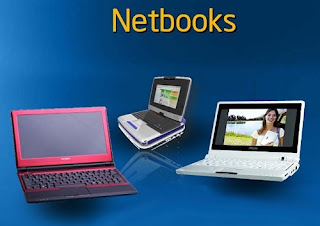
Nowadays the term Netbook is being widely used and many people are inquisitive about this latest type of gadget available in the market. While some vendors tout it as the latest in technology, here in India, most vendors delegate it to the lowest end of the spectrum as not worth the money. So what are netbooks and why should or shouldn't we buy them. We tried to go through the available information and models and bring the correct information to our readers.
What is a netbook?
Netbook is another name for small laptops (notebooks). It is small in size and light weight as compared to laptop. It has a small keyboard, small screen and small storage space. Netbook can be referred by many names like subnotebook, ultra-portable, mini-notebook, mini-thin client, cloudbook and ultra-mobile PC. Many manufacturers offer netbook models including Asus, Acer, Hewlett Packard, Dell, MSI® and others.
Difference between netbook and notebook.
The primary difference between a netbook and a notebook is their low power and slower processor as compared to notebook.
Netbooks are much lighter in weight than notebooks (.9 to 1.6 kg).
Netbooks are cheaper as compared to notebooks. (below Rs 20,000).
To achieve lower weight and price, many techniques are used. Netbooks may not have built in optical disc drives. They may use SSDs (solid-state storage devices) instead of hard disks as they require less power, are faster, lighter, and generally more shock-resistant.
Keyborad and screen of netbook may also be smaller than notebooks.
They may come with some variant of the Linux operating system to avoid MS-Windows licensing costs.
Why should we pay attention to netbooks.
While they are not as powerful as the higher performing laptop models available, they can still easily accomplish most common computing tasks for the average user. In fact, except for hardcore gamers, developers, and some power users, almost everybody else can perform all of their daily work on a netbook. Unlike lower priced notebooks that might be cheap due being old and obsolete, a netbook uses latest technology especially for network connectivity. Therefore, they are very suitable for connecting wirelessly to the Internet. Anyone can easily access email, get up-to-date news, check the latest scores and weather information and can enjoy digital videos, photos and music. Most people do their daily work on MS Office (Word, Excel and PowerPoint). While Office is able to run on netbooks running MS-Windows, by using free web-based alternatives like Google Docs, it is possible to do all that work on a netbook while avoiding the heavy storage and performance demands of MS-Office.
Another main attraction of the netbook is its portability. As they are much lighter in weight netbooks are very suitable for mobile people like college students, and those with a touring / traveling job.
In India, there is a large segment of people for whom computers and especially Internet can become within reach only due to netbooks. Having a low price, not having a constant power demand and coming in a single package makes it feasible for rural and low-income markets. It would be no surprise if in future we have a netbook penetration in India comparable to our mobile penetration.
Currently available netbook offerings in India
MSI Wind U130
Specifications:
- Intel Atom CPU N450@1.66GHz,
- 1.5 Kg
- 1 GB RAM
- 250 GB HDD
- 10" LCD display
DELL Inspiron Mini
Specifications:
- Intel Atom CPU N450@1.66GHz,
- 1.6 Kg
- 1 GB RAM
- 160 GB HDD
- 10.1" LCD display
SLIMMTRONICS Slimmbook
Specifications:
- Intel Atom CPU N270@1.60GHz,
- 1.6 Kg
- 1 GB RAM
- 160 GB HDD
- 10.1" LCD display
ACER Gateway LT2107
Specifications:
- Intel Atom CPU N450@1.66GHz,
- 1.4 Kg
- 2 GB RAM
- 320 GB HDD
- 10.1" LCD display
SAMSUNG N210
Specifications:
- Intel Atom CPU N450@1.66GHz,
- 1.6 Kg
- 1 GB RAM
- 160 GB HDD
- 10.1" LCD display
No comments:
Post a Comment